The single most valuable thing you can have in today’s digital world is a powerful personal brand.
It’s the thing that separates the unprofessional from the experts. It’s what makes someone excited to hop on a call with you or make the time for a coffee meeting. It’s the unspoken advantage every single industry leader has, and the thing that separates you from the competition.
What is a personal brand?
In the simplest way, building a personal brand on the Internet is simply the act of being intentional with the way you present yourself. I’d argue that all of us, inherently, have “personal brands.” We all have profiles and are essentially “judged” based on what people can assume based on what they see at a distance. The only difference is that some people are aware of the impact of their words, photos, etc., and others simply post whatever it is they’re feeling in that moment onto Facebook, Twitter, Instagram, etc.
However, that difference is a major one—and can drastically change the direction of your life, and your business, if executed correctly.
Most people don’t realize that the people they love to follow on social media are all masters of personal branding. That girl whose selfies seem so candidly perfect? A lot of work goes into making it seem that way. Or that guy who appears to be crushing it as an entrepreneur? He’s investing a lot of money in capturing that journey in a way that’s entertaining and enticing for people. And there is a very clear reason these people believe the time, energy, and the cost is worth it:
Attention is power.
When you can hold people’s attention, and you can build a sense of community and loyalty around what you do, then you have something incredibly valuable. Why?
- Attention (and a large audience) makes you the obvious choice as a speaker or special guest.
- Attention makes it easier for you to drive traffic or customers to a product or service you’ve created.
- Attention opens doors for collaboration that otherwise wouldn’t be possible.
- Attention means you can share your message faster and farther.
- Attention implies credibility, and credibility means more opportunities.
The list goes on and on…
Unfortunately, most people have absolutely no idea how to build a powerful personal brand online. They mistake posting poorly lit photos of their breakfast on Instagram with content that’s truly valuable and interesting to their target audience.
Here are 5 strategies for building the ultimate personal brand:
1. Clean up all your profile pictures and bios.
An easy “quick win” for you to execute immediately is for you to make sure your profile pictures look professional, and your bios clearly state who you are, what you do, and the value you would provide someone following you.
For example, let me break down all the different goals that are being accomplished by my own profile on Twitter:
First, my profile picture is a professional headshot. My co-founder took that one afternoon. Quick win.
Second, we designed a header image that instantly positions me as an authority. This is visually communicated through a photo of me speaking, some of my most impressive writing stats, my personal and company logos, and a memorable phrase that encapsulates my entire philosophy on writing. If you or someone at your company can’t do this for you, pay a graphic designer to create something like this for you. It is such a low-cost effort that immediately positions you as someone worth talking to in your industry.
Third, my Twitter bio lists who I am, what I do (and some credibility-reinforcing numbers), and the name of my company.
Fourth, the Tweet that I’ve pinned to the top of my profile is titled, How I Write 10,000 Words Per Day, Every Day. This is an article of mine that went viral and has a significant amount of social proof but also stands as a great introductory piece for someone new to my work (and reinforces credibility—because writing 10,000 words per day is a fairly uncommon thing).
All of these things can be fixed and executed in a matter of hours on a weekend. And yet, once you fix them, your profiles will continue to stand as a professional and impressive representation of who you are, at scale.
Don’t underestimate how valuable this can be.
2. Invest in a clean personal website.
One of the first things you should do, when building your personal brand, is buying a domain for your name (or something close) and build a personal website.
Reason being, you want your name to start ranking on Google—and the easiest way for that to happen is to own as much “digital real estate” around the name people will be searching. When I first started building my own personal brand online years ago, there were tons of different people who came up when I searched “Nicolas Cole” on Google.
Today, I single-handedly own the first several pages. And my personal website is the #1 search result.
This might not seem like the most important thing in the world, especially if you have a unique name. But imagine if your name was John Smith. If you just had an amazing coffee meeting with someone, and they typed your name into Google (you know, to do a little due diligence), then you would want them to see you as the #1 John Smith. Think about how that looks to the person searching your name. Of all the John Smith’s in the world, the one they just had coffee with is the one who owns the entire first page of Google.
That immediately implies an immeasurable amount of credibility.
Now, if you don’t have a huge budget or the skills to hire a firm to create a personal website for you, then do the bare minimum and use a template from Squarespace or Wix. These templates are incredibly easy to implement and look clean and professional.
3. Choose 1 social media platform to build a loyal audience.
One of the biggest mistakes people make when first starting to build their personal brand online is they try to be everywhere at once.
They sprint out the gate trying to create content on Facebook, write punchy copy on Twitter, post weekly videos on YouTube, share photos on Pinterest, and micro-vlog on Snapchat.
You’re wasting your time. I promise.
Especially when you’re first starting out, it’s so much more effective to master one platform, build a loyal audience, climb your way to the top, and THEN tell your followers, “You can also follow me over here…”.
The key to choosing the right social platform to invest in has everything to do with what industry you’re in. For example, if you’re in fashion, food, clothing, etc., then Instagram is an obvious choice. That platform was built for industries and products that rely on visuals. However, as say a founder of a company, Instagram might be a bit more of a challenge—for two reasons: first, the overwhelming audience on Instagram isn’t really there to “think deeply” about business insights, and second, entrepreneurship is such a mental game that it can really only be represented so many ways, visually.
As a writer and founder myself, I chose to start with a social platform built for written content: Quora.
Whenever I speak at conferences on the subject of personal branding, one of the questions I always get is, “But don’t you think a video is becoming more popular?”
No, I don’t.
In fact, my personal belief is that you will always be more successful in investing in what you are more naturally talented at. For example, I’m a writer. That’s what I do, that’s what I’m good at. So why would I make videos? Even if video content was (it’s not) 10X MORE “EFFECTIVE” than written content, I still believe I would be a more successful writer than I would a video maker—solely because I’m more naturally talented at writing, I enjoy it more, and thus, I’m more willing to stick with it over long, long periods of time (exponentially increasing the likelihood I’ll be successful at it).
So, choose a social platform that aligns with both your own interests, as well as the interests of your target audience. For example, my company Digital Press works exclusively with founders, C-suite executives, investors, speakers, authors, etc., helping them build powerful personal brands online, and we focus only on creating written content on platforms like LinkedIn, Quora, and Medium.
Why?
Because that’s where people want to read, to think, and to learn.
Snapchat would be a poor choice.
4. Don’t start and then stop. Long-term consistency is the KEY.
Building a powerful personal brand online is like going to the gym.
If you buy a bunch of new flashy gym clothes, and a membership to an expensive gym, and pay for a month of personal training, but then stop after 30 days, you honestly shouldn’t have even started in the first place.
The whole purpose of getting a gym membership and setting down that journey is to invest in a habit—not a destination. After all, what’s the point of spending six months getting fit and healthy if you’re just going to stop and then let all your hard work become reversed?
The same goes for personal branding.
The purpose isn’t to spend a bunch of money and then stop. It’s to make sharing who you are and what you know a fundamental part of the way you build your business. It’s a long-term investment in the way you are perceived in your industry. And honestly, it’s the long-term consistency that earns a level of respect you can’t buy like you can a press feature. Half the reason I get the amazing opportunities I do (to speak, to work with incredibly successful clients, to appear on huge podcasts, etc.) is because I’ve been writing online for years. Not days. Not weeks. Not months. 5+ years.
But, here’s what consistency over long periods of time looks like.
After writing on Quora for about 3 years, I decided to start copy/pasting some of my most popular content over to Medium at the beginning of 2017.
94 views in a month isn’t very impressive—and this is where 99% of people give up.
Well, I decided to stick with the process.
And one year later, I was averaging almost 500,000 views per month on my Medium content alone.
People are incredibly impatient when it comes to building a following on social media, but as someone who is speaking from experience, I can promise you that no other variables are worth talking about unless you are being consistent. Not “growth hacks.” Not “the time of day you post.” All those are tactics that only matter once you’re in a cadence.
5. Build a web of content surrounding your name, your company’s name, and keywords related to what you do.
Building a personal brand isn’t about “going viral” (and this is coming from someone who has written over 50 viral articles, and racked up tens of millions of views).
Personal branding is all about playing the LONG game, and the secret to success is to build a massive web of content that stretches all across the Internet.
How you do this is all about linking and laddering up credibility.
This is a big part of our unique approach to content marketing we execute for our clients at Digital Press. Part of ensuring your name sta+rts to “own” the first few pages of Google, and that people who search your name come across your company (and vice versa) is all about getting high-quality content in dozens of different places.
For example, one of the things most people don’t know about Medium is how powerful Medium publications can be for SEO. In fact, even though my Quora account has about 5x more content than my Medium account, my Medium profile ranks higher on Google. Similarly, if you search “Nicolas Cole thought leadership” (my name + keywords I want to rank for related to my business), two of the top three results are Medium related—and the TOP search result is a Medium publication that republished one of my pieces.
Multiply this recipe by hundreds of pieces of content, across hundreds of different websites, and the chances someone searching within the realm of content marketing / personal branding/thought leadership and coming across my content is incredibly high.
Fun fact: nearly a third of our business at Digital Press is inbound through my own personal brand—and we have worked with over 75 founders and c-suite executives all across the world.
If that’s not a clear ROI, I’m not sure what is.
***
This piece was originally published on Minutes.com.


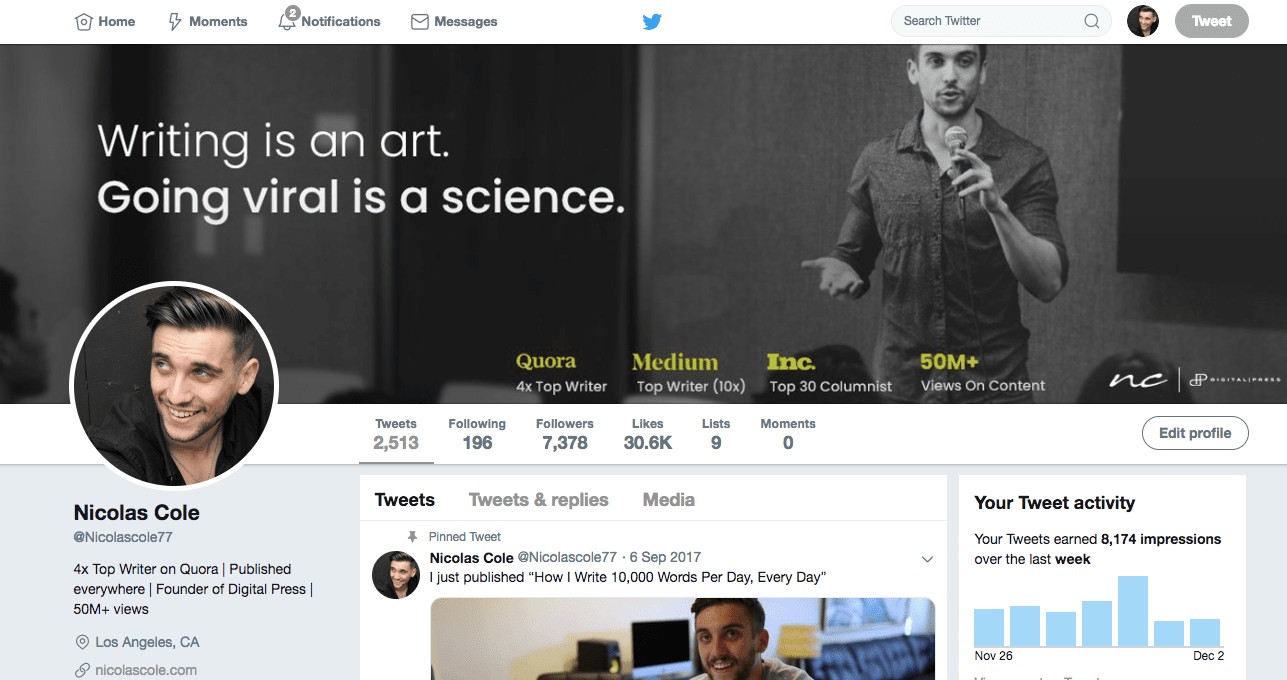
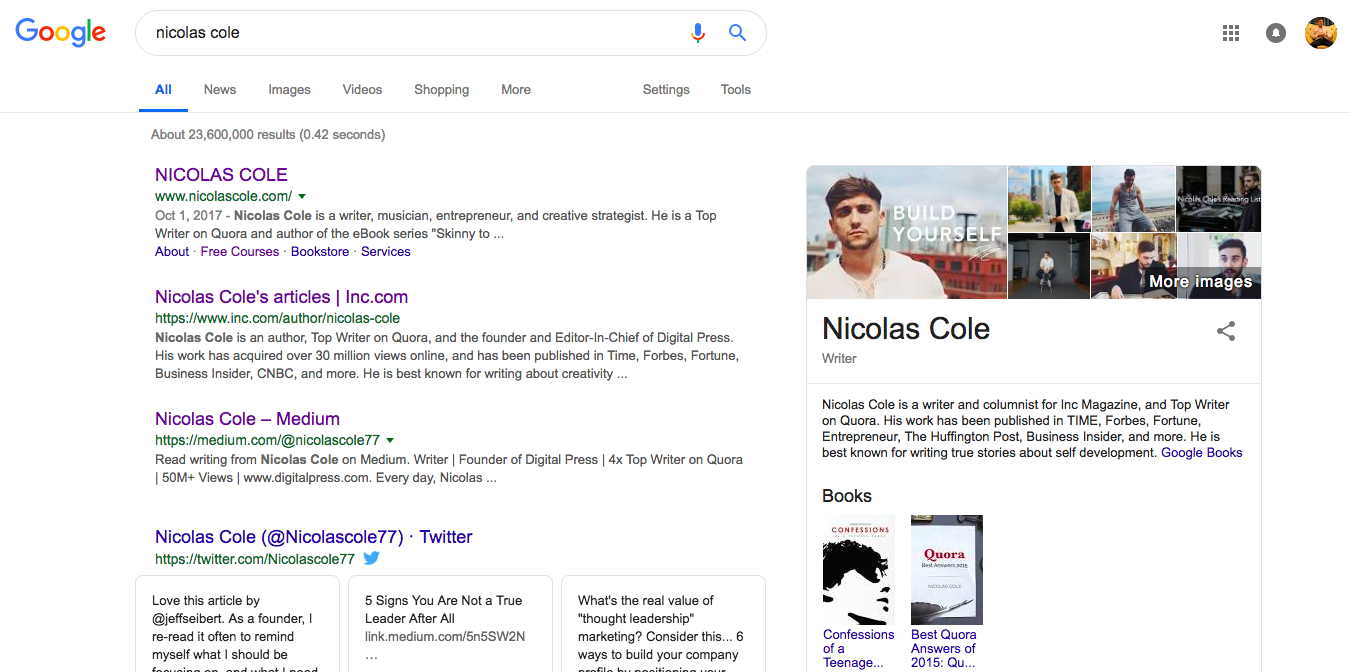
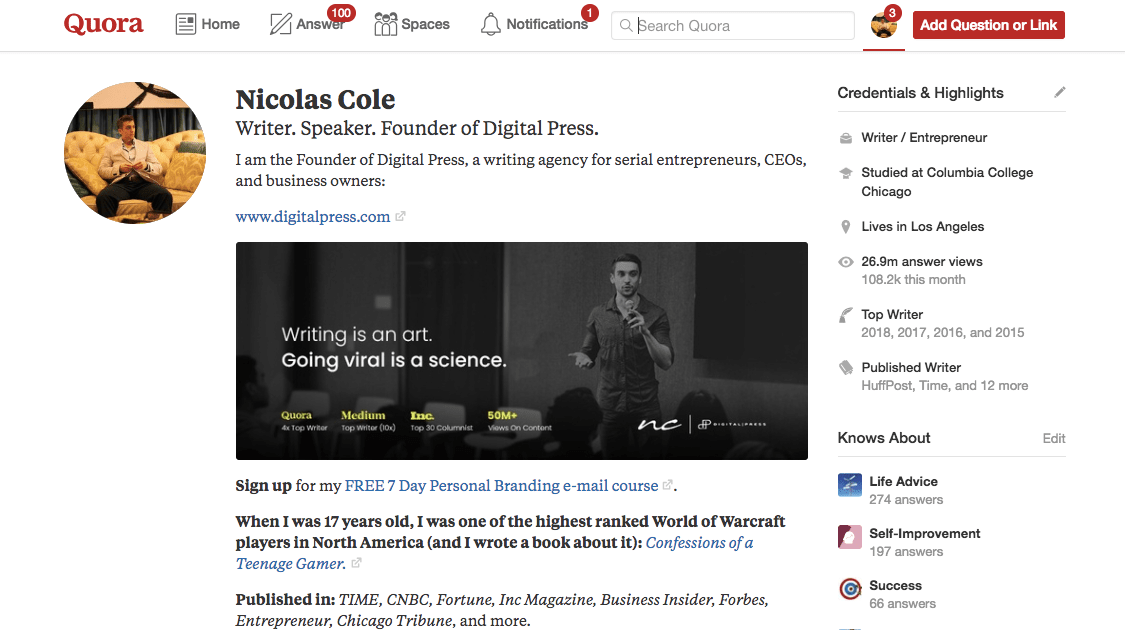
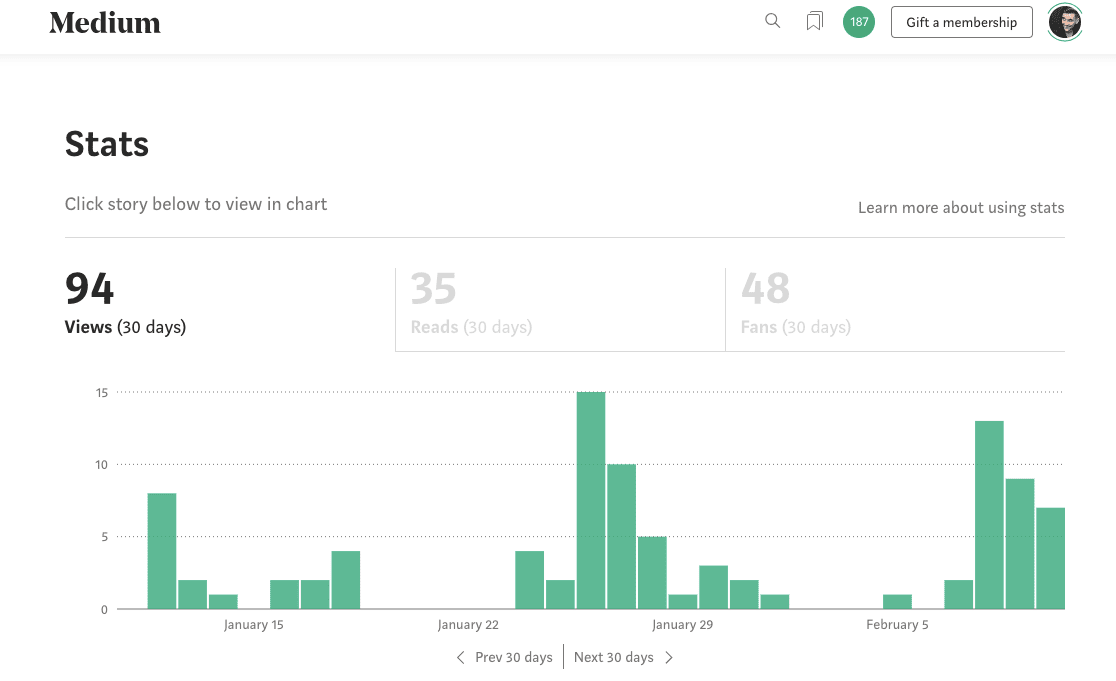
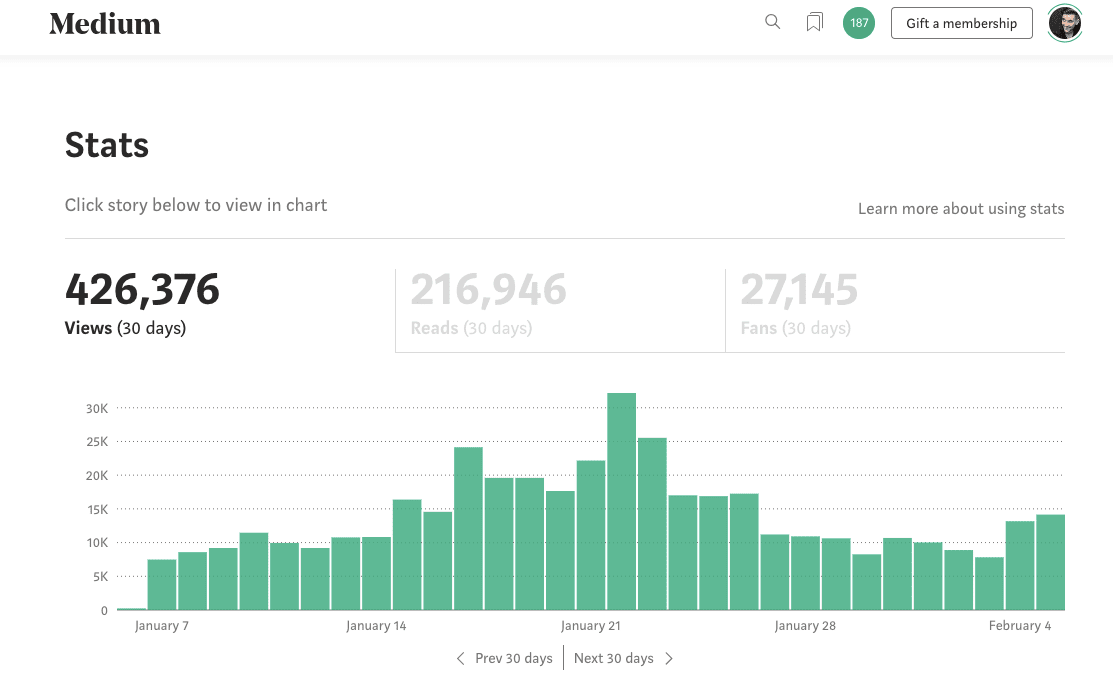
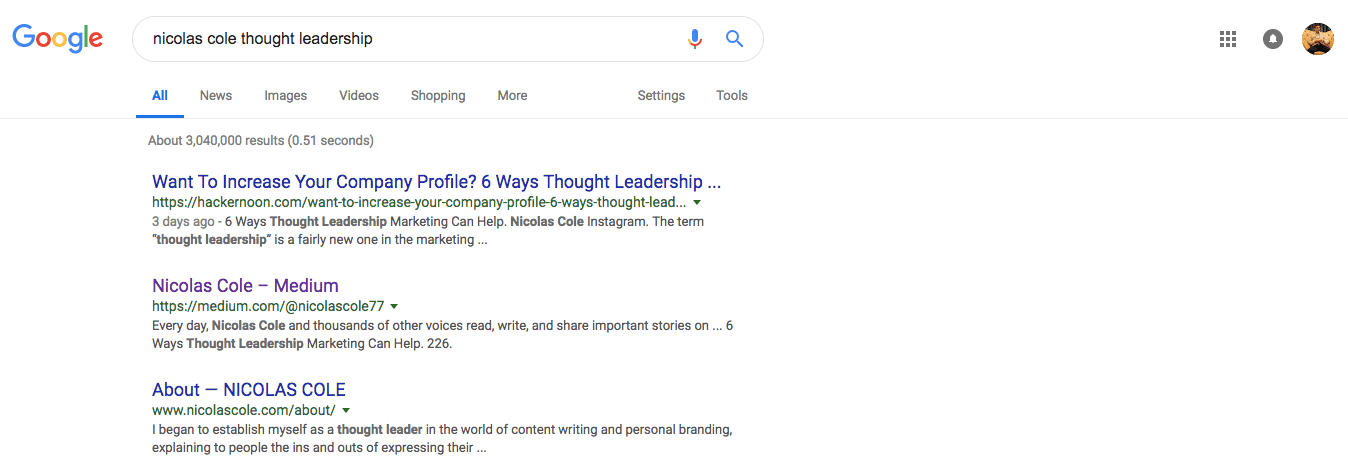
 Nicolas Cole is the founder of Digital Press, a content marketing agency that turns founders, executives, and entrepreneurs into world-renowned thought leaders. As an author, Cole is a 4x Top Writer on Quora and Top 30 Columnist for Inc Magazine with over 50 million views on his work. His writing has appeared in TIME, Forbes, Fortune, Business Insider, CNBC, The Chicago Tribune, and more.
Nicolas Cole is the founder of Digital Press, a content marketing agency that turns founders, executives, and entrepreneurs into world-renowned thought leaders. As an author, Cole is a 4x Top Writer on Quora and Top 30 Columnist for Inc Magazine with over 50 million views on his work. His writing has appeared in TIME, Forbes, Fortune, Business Insider, CNBC, The Chicago Tribune, and more.





